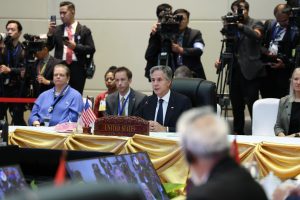U.S. Secretary of State Antony Blinken today condemned China’s recent assertive actions in the South China Sea, as he met leaders from the Association of Southeast Asian Nations (ASEAN) in Laos.
“We remain concerned about China’s increasingly dangerous and unlawful actions on the South and East China Seas, which have injured people, harmed vessels from ASEAN nations and contradict commitments to peaceful resolution of disputes,” Blinken told Southeast Asian leaders during the 12th ASEAN-U.S. Summit in Vientiane, the AFP news agency reported. He added that Washington “will continue to support freedom of navigation and freedom of overflight in the Indo-Pacific.”
The past year has seen an uptick in both the frequency and intensity of China’s incursions into contested parts of the South China Sea, particularly those claimed by the Philippines. The most heated incidents have involved its attempts to obstruct the Philippine resupply of a small contingent of troops stationed in a grounded warship at Second Thomas Shoal in the Spratly Islands, well inside its exclusive economic zone. The locus of tensions has in recent months shifted to Sabina Shoal, around 60 kilometers to the east.
Blinken’s comments came a day after Philippine President Ferdinand Marcos Jr. pressed ASEAN member states and China to speed up negotiations on a Code of Conduct for the South China Sea, citing Beijing’s ongoing “harassment and intimidation” of Philippine vessels.
Marcos made the remarks during the 27th ASEAN-China Summit, when leaders and representatives from the 10 ASEAN member states convened with Chinese Premier Li Qiang. After two years in which Philippine vessels had been“subjected to harassment and intimidation” by the China Coast Guard, Marcos said that substantive progress was necessary and that all parties must “be earnestly open to seriously managing differences,” according to a statement from his office.
“In our view, there should be more urgency in the pace of the negotiations of the ASEAN-China Code of Conduct,” Marcos told the meeting. “It is regrettable that the overall situation in the South China Sea remains tense and unchanged. We continue to be subjected to harassment and intimidation.”
The COC has been a perennial agenda item for China and ASEAN since 2002, when the two sides signed the non-binding Declaration of Conduct of Parties in the South China Sea (DOC) that pledged to “enhance favorable conditions for a peaceful and durable solution of differences and disputes among countries concerned.” Specifically, the DOC stated that the adoption of a Code of Conduct in the South China Sea would “further promote peace and stability in the region” and agreed to work toward this goal.
In theory, the COC would create a series of guidelines to deal with the mess of overlapping claims in the disputed waterway, which is claimed to varying degrees by China, Taiwan, Malaysia, the Philippines, Vietnam, and Brunei.
In practice, despite frequent pledges from both sides to speed up the talks, progress on the COC has been glacial. At yesterday’s summit, Marcos expressed frustration with the pace of negotiations on the COC, in particular with the fact that “core elements of the COC, such as the milestone issues of geographic scope, the relationship between the COC and DOC, and its legal nature to this day remain outstanding.” The Philippine leader also expressed surprise that “the definition of a concept as basic as ‘self-restraint’ does not yet enjoy consensus.”
“It is time that we tackle these milestone issues directly so we can make substantive progress moving forward,” he said.
Marcos’s call is unlikely to shock ASEAN and China into action. Promises to advance the COC have proliferated over the past two decades, to little detectable effect. Indonesia began its chairmanship in 2023 with a promise to speed up talks, with the aim of concluding a COC within three years. Malaysian Prime Minister Anwar Ibrahim has suggested that it will also be a priority when he takes over ASEAN’s rotating chairmanship in 2025.
The slow pace of the negotiations reflects the fact that only four of ASEAN’s 10 member states are formal claimants in the South China Sea. (Indonesia is sometimes included as a reluctant fifth.) The remainder are either unconcerned about the maritime disputes, enjoy close relations with China, or both. China’s continuing aggression against rival claimants is also doing little to generate the trust that would be necessary to finalize a Code. Indeed, many observers believe that despite China’s constant reference to the COC, it has no serious intention of finalizing an agreement, and is merely playing for time while its growing maritime power creates “facts on the ground” in contested waters.
For his own part, Chinese Premier Li Qiang struck a defiant note during yesterday’s 27th ASEAN Plus Three Summit, which was also attended by the leaders of Japan and South Korea. He described the South China Sea as “a shared home” and that China has an obligation to protect its sovereignty, the Associated Press reported, citing an ASEAN official who declined to be named due to the sensitivity of the discussion.
According to the official Chinese translation of his address to the Summit, Li later blamed “external forces” (read: the United States) for stoking tensions between rival claimant states.
“It must be noted that our development is still confronted with factors of instability and uncertainty,” he said. “In particular, external forces have frequently made interference and caused disruptions, and even attempted to bring bloc confrontation and geopolitical conflicts into Asia.”
Meanwhile, in Beijing, a Chinese Foreign Ministry spokesperson responded to Marcos’ comments by saying that China “will continue to work with ASEAN countries to fully and effectively implement the Declaration on the Conduct of Parties in the South China Sea, actively advance the consultations of the Code of Conduct in the South China Sea, and jointly make the South China Sea a sea of peace, friendship, and cooperation.”
Based on past precedent, however, it would be surprising if there was substantial progress between now and next year’s corresponding summits in Kuala Lumpur.

































